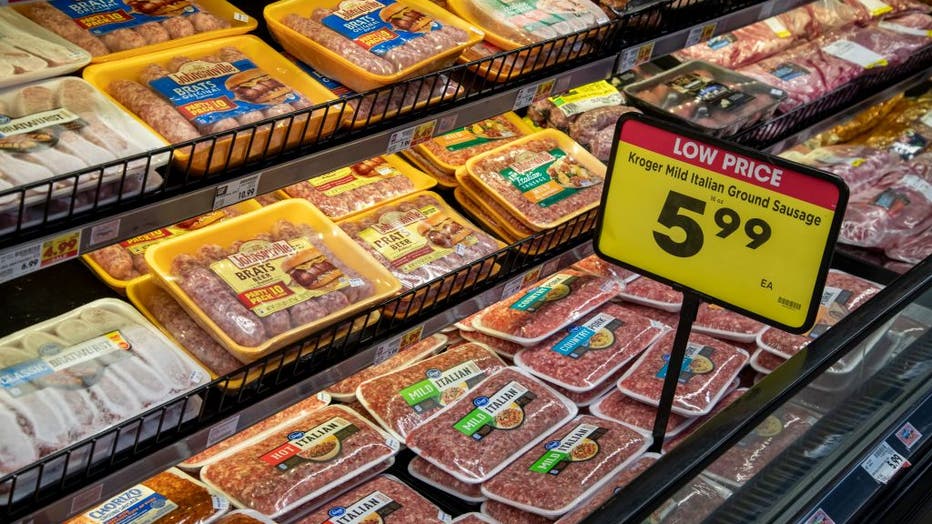Americans turn to sausage as economic pressures persist, survey finds
New inflation report: positive signals for economy
In the new report released this week, data points show price spikes are on the mend, and the economy is growing. Federal Reserve Chair Jerome Powell is still on track to cut interest rates. While these are positive signs, the labor market is now presenting challenges. Dr. Mike Walden, an economist, joins LiveNOW from FOX.
A new survey shows more Americans are buying sausage as opposed to more expensive meats, indicating the economy isn't as strong as many had hoped.
The Texas Manufacturing Outlook Survey said in its latest release that as the economy weakens, researchers are seeing a modest increase in people buying dinner sausages.
"This category tends to grow when the economy weakens, as sausage is a good protein substitute for higher-priced proteins and can "stretch" consumers’ food budgets," the survey said.

Palmer, Alaska. Meat counter showing a variety of sausage at a Fred Meyer grocery store, a sub of Kroger. The retail chain sells groceries, apparel, furniture, toys, electronics, and housewares. (Photo by: Michael Siluk/UCG/Universal Images Group via
"People at the end of the day are trading down right now," Kelly Lester, a policy analyst for the Center for Food, Power & Life at the John Locke Foundation told "Fox & Friends" on Thursday. "Budgets are strained and people are really feeling the effects of the last few years of inflation when it comes to the grocery store."
RELATED: Gen Z cynical about future as majority call cost of living the number one election issue
According to FOX News, the Bureau of Labor Statistics reported that sausage is approximately $6 cheaper than beefsteak, explaining why more Americans are turning to the cheaper option. The average price of both sausage and beefsteak has climbed consistently since 2020.
Inflation is easing
An inflation measure closely tracked by the Federal Reserve remained low in July, extending a trend of cooling price increases that clears the way for the Fed to start cutting its key interest rate this month for the first time in 4 1/2 years.
Prices rose just 0.2% from June to July, the Commerce Department said, up a tick from the previous month’s 0.1% increase. Compared with a year earlier, inflation was unchanged at 2.5%. That's just modestly above the Fed's 2% target level.
Americans are still feeling the financial pinch
Still, despite the near-end of high inflation, many Americans remain unhappy with today's sharply higher average prices for such necessities as gas, food and housing compared with their pre-pandemic levels.
RELATED: Inflation eases in July, but these cities are dealing with the worst of it: Study
Excluding volatile food and energy costs, so-called core inflation rose 0.2% from June to July, the same as in the previous month. Measured from a year earlier, core prices increased 2.6%, also unchanged from the previous year. Economists closely watch core prices, which typically provide a better read of future inflation trends.

